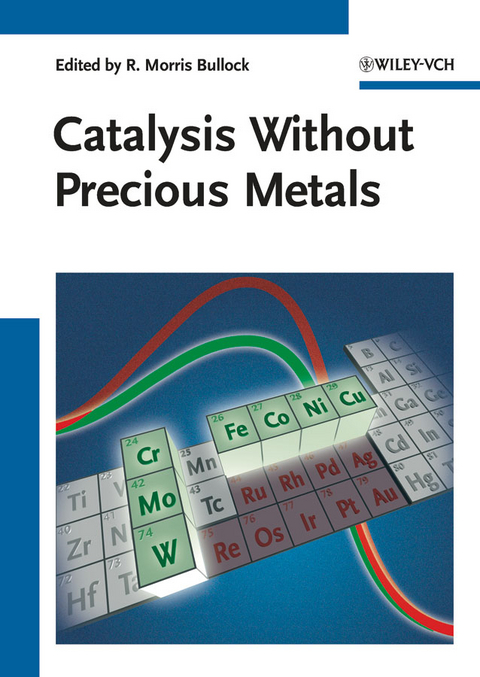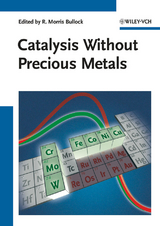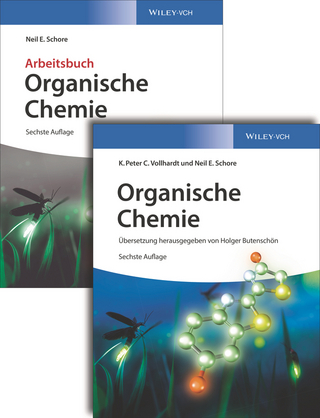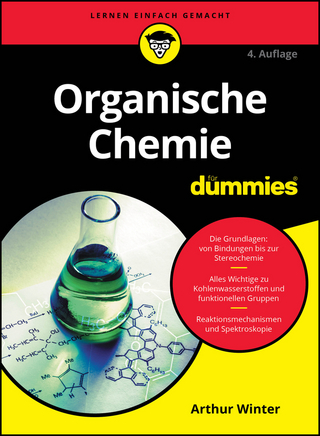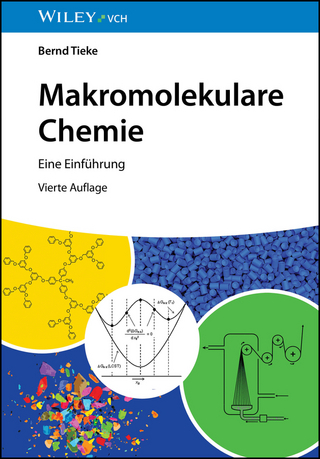Catalysis without Precious Metals
Wiley-VCH (Verlag)
978-3-527-32354-8 (ISBN)
The need to find catalysts that do not rely on precious metals is driven by several reasons. There are substantial costs for both the metal and the recovery and recycling of the metal, some metals are required in impossibly huge amounts and some metals like iron have a minimal environmental and toxicological impact.
Dieses Handbuch für Chemiker in der Industrie und an Forschungsinstituten fasst die jüngsten Fortschritte auf dem Gebiet übersichtlich zusammen. Die einzelnen Beiträge zeigen, bei welchen Reaktionen neue Katalysatoren den Einsatz teurer Metalle überflüssig machen könnten, verschweigen aber auch nicht, welche Probleme dadurch noch nicht gelöst werden.
After 21 years at Brookhaven National Laboratory in Long Island, New York, Morris Bullock moved to Pacific Northwest National Laboratory in 2006, where he is a Laboratory Fellow, as well as Director of the Center for Molecular Electrocatalysis. Dr. Bullock's research interests focus on reactivity of metal hydrides, including proton transfer, hydride transfer, and hydrogen atom transfer reactions, and on the development of molecular catalysts for the oxidation of hydrogen and production of hydrogen.
Preface
CATALYSIS INVOLVING THE H*TRANSFER REACTIONS OF FIRST-ROW TRANSITION METALS
H*Transfer Between M-H Bonds and Organic Radicals
H*Transfer Between Ligands and Organic Radicals
H*Transfer Between M-H and C-C Bonds
Chain Transfer Catalysis
Catalysis of Radical Cyclizations
Competing Methods for the Cyclization of Dienes
Summary and Conclusions
CATALYYTIC REDUCTION OF DINITROGEN TO AMMONIA BY MOLYBDENUM
Introduction
Some Characteristics of Triamidoamine Complexes
Possible [HIPTN3N]Mo Intermediates in a Catalytic Reduction of Molecular Nitrogen
Interconversion of Mo(NH3) and Mo(N2)
Catalytic Reduction of Dinitrogen
MoH and Mo(H2)
Ligand and Metal Variations
Comments
MOLYBDENUM AND TUNGSTEN CATALYSTS FOR HYDROGENATION, HYDROSILYLATION AND HYDROLYSIS
Introduction
Proton Transfer Reactions of Metal Hydrides
Hydride Transfer Reactdions of Metal Hydrides
Stoichiometric Hydride Transfer Reactivity of Anionic Metal Hydride Complexes
Catalytic Hydrogenation of Ketones with Anionic Metal Hydrides
Ionic Hydrogenation of Ketones Using Metal Hydrides and Added Acid
Ionic Hydrogenations from Dihydrides: Delivery of the Proton and Hydride from One Metal
Catalytic Ionic Hydrogenations With Mo and W Catalysts
Mo Phosphine Catalysts With Improved Lifetimes
Tungsten Hydrogenation Catalysts with N-Heterocyclic Carbene Ligands
Catalysts for Hydrosilylation of Ketones
Cp2Mo Catalysts for Hydrolysis, Hydrogenations and Hydrations
Conclusion
MODERN ALCHEMY: REPLACING PRECIOUS METALS WITH IRON IN CATALYTIC ALKENE AND CARBONYL HYDROGENATION REACTIONS
Introduction
Alkene Hydrogenation
Carbonyl Hydrogenation
Outlook
OLEFIN OOLIGOMERIZATIONS AND POLYMERIZATIONS CATALYZED BY IRON AND COBALT COMPLEXES BEARING BIS(IMINO)PYRIDINE LIGANDS
Introduction
Precatalyst Synthesis
Precatalyst Activation and Catalysis
The Active Catalyst and Mechanism
Other Applications
Conclusions and Outlook
COBALT AND NICKEL CATALYZED REACTIONS INVOLVING C-H AND C-N ACTIVATION REACTIONS
Introduction
Catalysis with Cobalt
Catalysis with Nickel
A MODULAR APPROACH TO THE DEVELOPMENT OF MOLECULAR ELECTROCATALYSTS FOR H2 OXIDATION AND PRODUCTION BASED ON INEXPENSIVE METALS
Introduction
Concepts in Catalyst Design Based on Structural Studies of Hydrogenase Enzymes
A Layered or Modular Approach to Catalyst Design
Using the First Coordination Sphere to Control the Energies of Catalytic Intermediates
Using the Second Coordination Sphere to Control the Movement of Protons between the Metal and the Exterior of the Molecular Catalyst
Integration of the First and Second Coordination Spheres
Summary
NICKEL-CATALYZED REDUCTIVE COUPLINGS AND CYCLIZATIONS
Introduction
Couplings of Alkynes with alpha, beta-Unsaturated Carbonyls
Couplings of Alkynes with Aldehydes
Conclusions and Outlook
COPPER-CATALYZED LIGAND PROMOTED ULLMANN-TYPE COUPLING REACTIONS
Introduction
C-N Bond Formation
C-O Bond Formation
C-C Bond Formation
C-S Bond Formation
C-P Bond Formation
Conclusion
COPPER-CATALYZED LIGAND PROMOTED ULLMANN-TYPE COUPLING REACTIONS
Introduction
C-N Bond Formation
C-O Bond Formation
C-C Bond Formation
C-S Bond Formation
C-P Bond Formation
Conclusion
COPPER-CATALYZED AZIDE-ALKYNE CYCLOADDITION (CuAAC)
Introduction
Azide-Alkyne Cycloaddition: Basics
Copper-Catalyzed Cycloadditions
"FRUSTRATED LEWIS PAIRS": A METAL-FREE STRATEGY FOR HYDROGENATION CATALYSIS
Phosphine-Borane Activation of H2
"Frustrated Lewis Pairs"
Metal-Free Catalytic Hydrogenation
Future Considerations
"In summary, this monograph gives a good overview on the present state of the art in applying non-precious metal catalysts for a variety of applications. This is a fast moving area of research and for some reactions even better results have been produced in the last one or two years. This does by no means detracts from the value of this monograph, but indicates that the future of the field might look even brighter." (ChemCatChem, 2011)
"However, that is unlikely to put off the target audience for whom this book would be useful as a library resource, to dip into as and when needed, rather than an essential read for researchers in this field". (Chemistry World, 1 May 2011)
"The 306-page hardcover book summarizes recent progress in the field, pointing to how new catalysts may ultimately supplant precious metals in some types of reactions. Also, the book goes on to highlight the remaining chemical challenges and areas in need of further study". (Fuel Cell Works, 21 December 2010)
"A new book edited by Dr. Morris Bullock of Pacific Northwest National Laboratory summarizes the progress and challenges of designing catalysts from less expensive, more abundant metals . . . also, the book goes on to highlight the remaining chemical challenges and areas in need of further study. The book was written by experts from the United States, Canada, the United Kingdom and China." (Technology Today, 20 December 2010)
| Erscheint lt. Verlag | 8.9.2010 |
|---|---|
| Sprache | englisch |
| Maße | 170 x 240 mm |
| Gewicht | 815 g |
| Themenwelt | Naturwissenschaften ► Chemie ► Organische Chemie |
| Schlagworte | catalysis • Chemie • Chemistry • Coordination Chemistry • Edelmetalle • Industrial Chemistry • Katalyse • Koordinationschemie • Methods - Synthesis & Techniques • Methods - Synthesis & Techniques • Organic Chemistry • Organische Chemie • Organische Chemie / Methoden, Synthesen, Verfahren • Technische u. Industrielle Chemie |
| ISBN-10 | 3-527-32354-6 / 3527323546 |
| ISBN-13 | 978-3-527-32354-8 / 9783527323548 |
| Zustand | Neuware |
| Haben Sie eine Frage zum Produkt? |
aus dem Bereich
